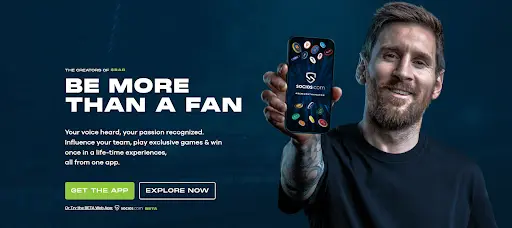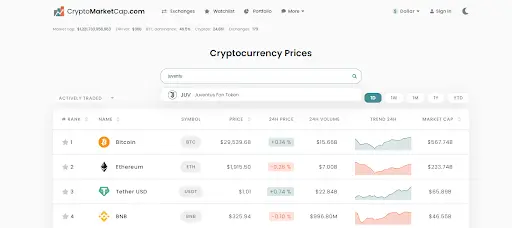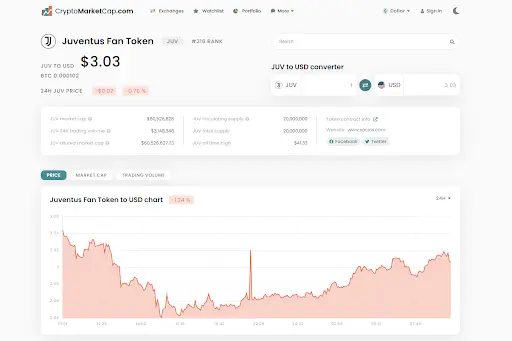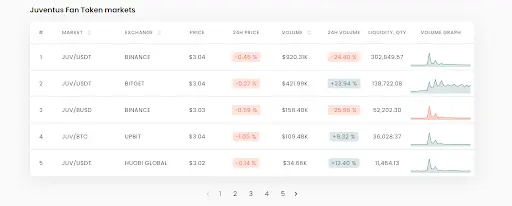Everything You Need to Know About Fan Tokens

ethereum
You’ve probably heard of utility tokens, governance tokens, and even security tokens, but do you know what a fan token is?
Technology and sports are two domains that are never shy of intersecting, especially when there’s money to be made. Sports stars are arguably the most recognizable figures on the planet, and their salaries and the revenues of their employers tend to match up.
It’s no surprise that crypto has made its way into the sporting arena as a result. But what exactly are fan tokens, why do they have value, and who do they make money for?
Let’s investigate.
What are Crypto Tokens?
Crypto is backed by blockchain technology. What this comes down to is that blockchains are a network of many decentralized nodes keeping track of transactions.
These transactions generally involve the blockchain’s native coin, such as BTC for Bitcoin and ETH for Ethereum. However, blockchains that support smart contracts, such as Ethereum and BNB Smart Chain, allow users to create their own digital assets.
These custom-created digital assets are called “tokens.” The most common tokens are ERC-20 tokens on the Ethereum blockchain. ERC-20 is a token standard, meaning that a token has to have certain characteristics to qualify as one. Other blockchains have equivalent standards, such as BEP-2 on the aforementioned BNB Smart Chain.
ERC-20 and BEP-2 tokens are fungible, which means that they’re actually quite similar to most native blockchain coins. They can have a certain supply, which is defined by their creator, and you may have heard of protocols like Chainlink—well, the LINK token that represents Chainlink’s market cap is an ERC-20 too.
What is a Fan Token?
Fan Tokens are just like other crypto tokens in that they’re created and run on a smart contract-capable blockchain. What sets them apart, however, is the fact that they grant holders certain perks that are tied to the sporting organization that they represent.
Most crypto tokens are created for a purpose. Some are meant to represent securities and commodities; others serve as a means of payment, governance, or other utility. Fan tokens, on the other hand, entitle holders to various tangible and intangible benefits.
The fan token model first appeared when football stadiums all across Europe closed due to the COVID-19 pandemic. Matchday revenue is a huge factor for most clubs, and many have suffered drastically without ticket receipts and other associated incomes.
Therefore, fan tokens were an easy sell. Most football clubs, let alone sporting organizations, are supposed to be profit-oriented businesses.
This isn’t always the case, from billionaires treating clubs as PR vehicles and elaborate playthings to Middle Eastern regimes attempting to launder their reputations via sports clubs, but there was never going to be a better time for it.
Clubs were thrilled to find platforms like Socios offering them entirely new revenue streams, and in June 2020, no less a giant than Spanish behemoth FC Barcelona launched a fan token. It sold out in just two hours, generating over $1.3 million.
A significant number of football clubs, as well as other sporting organizations, have jumped on the bandwagon since.
It’s notable that not every sport sees fan tokens as the way to go. NFT collections such as the NBA’s Top Shot have made their mark, and football itself has NFT options as well, such as the Sorare platform. Regardless, fan tokens are a big deal, and BBC News even covered them in 2021.
How Fan Tokens Work
When a team wants to issue a fan token, they generally ink a deal with a platform that does business with this sort of thing. One of the leaders in this regard is Socios, which is part of the Chiliz blockchain ecosystem.

The fact that the Socios home page splashes an image of one of the sport’s most recognizable and iconic stars says volumes about the adoption they’ve seen from the sport itself. Lionel Messi’s former team, Barcelona, was one of the first to get on board, and his current club, PSG’s fan token, isn’t doing too badly either.
Once the team signs up with a platform, they schedule a fan token offering (FTO). An FTO is generally done alongside an exchange partner for even more access to customers, but that isn’t always the case.
Fans can participate in the FTO and pick up their fan tokens at a set price for their duration. Following the FTO, however, the fan token is allowed to float and can rise or fall as market forces suggest.
As you can probably imagine, it’s generally the case that the fan tokens of a particular team does well when the team prospers. That said, the value of the fan token also corresponds with the benefits committed by the issuing team in question.
What are the Benefits of Fan Tokens?
From a sporting organization’s point of view, fan tokens provide a revenue stream and another way to monetize the support they enjoy. Often, season ticket holders and stadium-goers tend to be relatively local, but fan tokens can be sold to fans who’ve never seen a game live.
For fans, on the other hand, fan tokens tend to grant a level of access that they wouldn’t otherwise have. Sporting organizations often organize meet-and-greet sessions for fan token holders, give them discounts on tickets and merchandise, and even offer a certain amount of governance.
While it’s unlikely that any of the current top clubs will put major decisions into fans’ hands, they allow fan token holders to vote on things like jersey colors and armbands. They’ve even allowed fan token holders to pick lineups for occasional non-competitive games.
How to Buy Fan Tokens
Here’s how you can buy fan tokens and support your club or sporting organization:
#1. Check Fan Token Availability
If you’re not sure whether your team has a fan token, simply visit cryptomarketcap.com and use the search bar to search for your team’s name. If they have a fan token, you should see a hit immediately. Then click on the name to visit the fan token’s Cryptomarketcap profile page.

For this example, we’ll use Juventus, one of Italy’s most successful football teams and one-time home to some of football’s best ever, Zinedine Zidane, Zlatan Ibrahimovic, Cristiano Ronaldo, etc.

You’ll see a lot of the key information here, including how much the token costs right now and which website you can visit to learn more about it.
#2. Find Out Where to Buy the Fan Token
Staying on the fan token’s Cryptomarketcap page, scroll down until you find the ‘Markets’ section. The ‘exchange’ column will give you an idea of which exchanges you must visit to buy the fan token.

#3. Buy From Exchange or Fan Token Platform
Now that you know where to buy the fan token, you only need to navigate to that exchange. Alternatively, you can visit the website listed at the top of the fan token’s Cryptomarketcap page, which in the Juventus Fan Token’s case is the Socios platform.
Now all you need to do is sign up for access on this platform or the exchange you’ve chosen, and you’re good to go!
Fan Tokens vs. NFTs
We’ve already mentioned NFT collectible projects like NBA Top Shot and Sorare, but things get a little confusing when sports teams release fan tokens and NFTs. Luckily, the difference is relatively clear-cut.
Non-fungible tokens, by their very definition, are verifiably unique digital assets. Fungible tokens, which fan tokens are, are not unique. One JUV token can be exchanged for any other JUV token, but you can’t do the same thing with two Sorare player cards.
NFTs have a whole host of applications, but sports teams have so far only utilized them as collectibles. These collectibles are meant to be unique pieces, and while they can also entitle the owner to various benefits, these benefits would also be unique to the owner.
Fan tokens, on the other hand, are easily traded. They’re also far easier to use in things like polls for voting, with holders of more fan tokens naturally gaining a louder voice in the vote. Many fan tokens have also been used to guarantee access to, or the privilege to buy, NFTs issued as collectibles.
Future of Fan Tokens
Fan tokens are an experimental way for sporting organizations to get closer to their fans, but they’re also unregulated. This leaves a lot up in the air because the ecosystem of regulation around sports itself is extremely murky.
Sport is a business, and football is the number one sport in the world. That also means that the sport’s regulators are some of the most controversial out there, and corruption in football has already been found to be of a staggering scale.
That said, football clubs and their owners aren’t always clean, either. Profit remains the number one objective for many, so it’s the prospective buyers, the fans themselves, who must be protected if fan tokens become a trend rather than a fad. They could stick around, but only if they provide the fan with true value.
Key Takeaways
A fan token is a type of blockchain-based token that runs on smart-contract-capable blockchains. They were created during the outbreak of the COVID-19 virus, when clubs needed revenue to replace the losses caused by empty stadiums.
These innovative digital assets provide their owners with various benefits dictated by the club that issues them. These tend to include meet-and-greets or autograph sessions for owners, special events, and even voting on certain matters of the club, such as lineups for friendlies or jersey colors.
Fan Token FAQ
What do teams get from fan tokens?
Money. When a fan token offering is conducted, much of the revenue from the sale of tokens goes to the team or sporting organization it represents.
Can I buy fan tokens on Binance?
Yes. Binance is one of the largest exchanges to adopt fan tokens, although you’ll find them listed on several other major exchange platforms as well.
Does AC Milan have a fan token?
Yes! AC Milan does have a fan token alongside its city rivals Inter as well as other Serie A giants Napoli, Juventus, Lazio, and Roma. The Italian football team also has a fan token, as does reigning world champion Argentina. Many big South American teams have fan tokens too, and most of Europe’s top leagues are represented by the likes of PSG, Galatasaray, Arsenal, Porto, and Atletico Madrid.